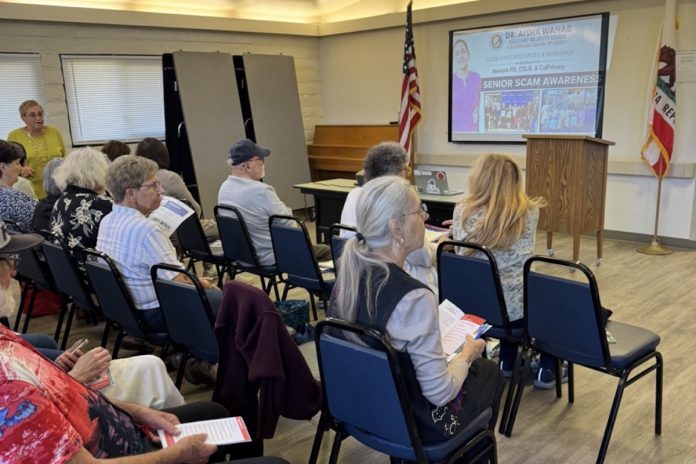Don’t answer the phone and don’t open the door for anyone you don’t know. Those were the two main messages from a workshop for seniors on how to prevent scams. The event took place at the Clark W. Redeker Newark Senior Center on Wednesday, Oct. 29. It was organized by Senator Aisha Wahab’s Office and the City of Newark. About 20 people attended the presentation.
Facilitators said that seniors tend to get targeted the most because of their accumulated wealth or retirement savings. It also has something to do with their personality.
“You’re polite, you value interacting with people. When people approach you, you may feel pressure to speak to them,” said Kyra Hall, an outreach coordinator for the Contractors State License Board (CSLB). “A lot of seniors may be isolated, you may live alone, you may spend a lot of time alone.”
Scams can happen in-person, online and most commonly by phone. A well-known one is called a “grandparent scam.” This one involves a person posing as a grandchild and calling the senior to say they’re in a crisis and they need money now. The person tries to isolate the senior and tell them to not tell anyone else. One way for someone to protect themselves from this scam is to call the person’s parents or other relatives to make sure that person is actually trying to reach them.
A solar scam is one that may seem legitimate because they say solar panels are free and that the government is paying. Hall made it clear that solar is not free “across all boards.”
Other types of scam calls mentioned in the workshop involve fake tech support, computer security companies, lottery officials, health insurance companies, charities and IRS workers. Romance scams can involve dating apps like Tinder, where someone will catfish a senior and ask for money. Scammers can receive the money through wire transfer, gift card, and account and router numbers.
The investment scam can involve a call where someone says the person can become rich if they buy something and sell it back in the future. Juan Herrera from the Newark Police Department said one case involved a scammer saying the price of gold is going up, and the person should buy it now while it’s cheap. The person then sent the scammer $2 million dollars.
“If it sounds too good to be true, it’s a scam,” said Herrera.
A scam is a crime that should be reported to the police. But, seniors often don’t talk to the police.
“Unfortunately what winds up happening is when these scams do occur, the victim doesn’t come to the police department,” said Herrera. “They usually talk about it to another person. Whether it be a social worker or the bank, who starts looking into their bank statements. Or they’re talking to a nurse or a doctor.”
He also added that scammers are not always strangers. They can be a family member, a doctor or someone who works at a senior center.
Several questions from the audience were related to actually answering the calls and speaking to someone. One person was concerned their voice can be used to make AI content. Herrera said, “Don’t provide any personal information.”
“What they are looking for is your information, some way to be able to access your account,” he said.
Another audience member said they don’t even answer, especially if they don’t have them as a contact. Another senior said when it comes to donating money, do not use electronic payment forms like Zelle.
Important questions were also answered about contractors. Hall said every contractor working on a project $1,000 or more should be licensed by the Contractors State License Board. The agency is a state regulator of the construction industry and provides consumer protection for people paying for home improvement projects.
“We see a lot of construction companies or scammers posing as construction companies,” she said.
Tom Kemp from California Privacy Protection Agency said people can reduce their digital footprint “by thinking about how [they] can exercise [their] privacy rights.”
He said when visiting websites, every person has a right to click “do not sell or share my information,” get information deleted from background check sites, and for Google to “remove webpage from Google index.”
That way, people can reduce their chances of being scammed. Kemp said, on Jan. 1 the Delete Request and Opt-Out Platform (DROP) will go live on their website. He said it will “significantly and radically reduce your digital footprint.”
For more information on DROP, go to privacy.ca.gov/DROP.




